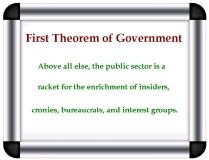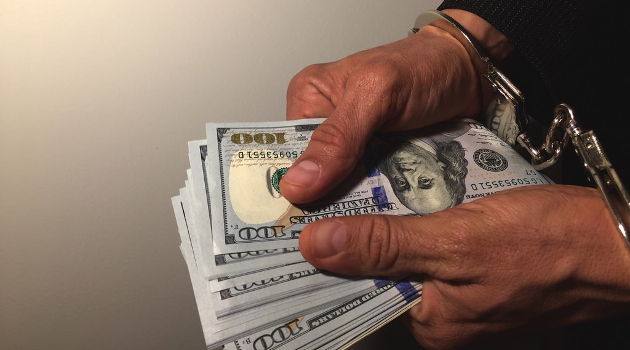Ordinary Americans have a low opinion of Washington, but they’re underestimating the extent of the problem.
The nation’s capital is basically a playpen for special interests.  It’s now the richest region of the country, with lobbyists, bureaucrats, contractors, politicians, and other insiders and cronies getting fat and happy thanks to money that is taken from people in the productive sector of the economy.
It’s now the richest region of the country, with lobbyists, bureaucrats, contractors, politicians, and other insiders and cronies getting fat and happy thanks to money that is taken from people in the productive sector of the economy.
Republicans play the game and Democrats play the game, with both sides getting undeserved wealth at our expense.
Let’s take an up-close look at how this sordid game is played.
Here are some excerpts from a column by Catherine Rampell in today’s Washington Post.
The GOP is no longer the Party of Reagan. It’s the Party of Michael Cohen. …the Cohen blueprint for achieving the American Dream: Work minimally, if you can, and leverage government connections whenever possible. …following Donald Trump’s unexpected presidential victory,
Cohen cashed in. …Cohen told companies that he could provide valuable “insights” into the new administration. Huge multinational corporations lined up to purchase these “insights,” dumping millions into Essential Consultants LLC… Cohen is hardly the only prominent Trumpster invoking White House connections… Cabinet members and other senior government officials, too, have enjoyed a sweetheart apartment deal, lobbyist-arranged vacations and private jet rides. These are not amenities secured through brains, honesty and hard work, the virtues that Republicans traditionally say are required for upward mobility and financial comfort. They are the fruits of luck, cronyism and a loose approach to ethical lines.
This is disgusting. Republicans often come to Washington claiming they’re going to “drain the swamp.” Many of them, however, quickly decide it’s a hot tub.
But don’t forget that sleaze is a bipartisan activity in Washington.
Here are excerpts from a Wall Street Journal report about influence-peddling on the other side of the aisle.
Tony Podesta was in line to be king of K Street. His lobbying firm ended 2015 as the third largest in Washington, D.C., with nearly $30 million in revenue from more than 100 clients, spanning Alphabet Inc.’s Google to Wells Fargo & Co. With his longtime friend Hillary Clinton expected to win the White House,
2016 promised to be even better. Mr. Podesta…hosted lawmakers and power brokers at his flat in Venice during the Art Biennale. It was one of many homes around the globe, including the Washington mansion where he displayed a collection of museum-grade artwork. In early 2016, he was ready to buy a $7.4 million condo overlooking Madison Square Park in New York City. …At age 59, he married Heather Miller, a congressional staffer 26 years younger. …Mrs. Podesta started her own lobbying firm, Heather Podesta + Partners, and they emerged a Washington power couple. …Mr. Podesta drew an annual salary of more than $2 million and made millions more in commissions and bonuses. …The Podesta Group grew from the 20th largest lobbying firm to third in three years, in terms of domestic and foreign lobbying revenues, propelled by business during President Barack Obama’s first term.
But this story of graft and corruption has a happy ending.
Then he fell, a calamitous collapse… The Podesta Group lost its banker over news the firm did work for the U.S. subsidiary of a Russian bank under sanctions. …Mrs. Clinton’s…victory would go a long way to fixing many of his problems. She lost…and Mr. Podesta, like many who had banked on her victory, did too. Clients who had hired him for access to a new Clinton administration fell away. By the end of the year, the departures cost the firm more than $10 million in annual business… the Podesta Group did public relations work in 2015 for Raffaello Follieri, an Italian businessman who had pleaded guilty to swindling millions of dollars from an investment fund run partly by Mr. Clinton, one of Mr. Podesta’s early patrons. …Before closing the firm’s doors, Mr. Podesta gave himself an advance on his lobbying commissions.
The common theme, as explained by Karen Tumulty for the Washington Post, is that D.C. is an utterly corrupt place.
…the game in Washington never really changes. The only things that shift from election to election are the most sought-after players. …When Trump won, the traditional rosters of lobbyists — ex-congressmen, lawyers from white-shoe firms, former congressional staffers
— were of little use in figuring out and gaining access to a band of outsiders who came to town vowing to demolish the old order. Cohen was not the only Trump insider to see a chance to cash in… The president’s former campaign manager, Corey Lewandowski, along with former Trump aide Barry Bennett, also opened a consulting firm, which quickly had more business than it could handle. “It was like shooting fish in the barrel,” Bennett told The Post. …Nor is Team Trump unique in seizing these opportunities. President Barack Obama had not been in office a month before his 2008 campaign manager, David Plouffe, was paid $50,000 to give a speech in Azerbaijan to a group with close ties to that repressive government. …Washington continues to have a most durable ecosystem: The swamp is never drained; it just gets taken over by different reptiles.
Utterly nauseating.
But allow me to point out that lobbying isn’t inherently bad. And neither are campaign contributions. It all depends on the reason.
If a company hires a lobbyist or give cash to a politician because it wants handouts or government intervention that will produce unearned profit, that’s wrong. Sort of like being a co-conspirator to a crime.
However, if a company hires a lobbyist and donates money because it is fighting tax hikes or new regulatory burdens, that’s noble and just. Sort of like engaging in an act of self-defense.
But wouldn’t it be wonderful if there wasn’t a need for either the bad type of lobbying or the good type of lobbying?
Richard Ebeling, a professor at the Citadel, offers a very good solution in a column for the Foundation for Economic Education. He starts by explaining that government and corruption have always been connected.
The corruption of government officials seems to be as old as recorded history. …the ancient Roman senate passed laws
against such political corruption in the first century, B.C. …Emperor Constantine issued one of the strongest decrees against corruption during this time in A.D. 331. …Today, high levels of political corruption remain one of the major problems people confront around the world. …Political corruption, clearly, is found everywhere around the world… Why?
Richard answers his own question, pointing out that big government is a major enabler of corruption.
Part of the answer certainly…can be found in the relationship between the level of corruption in society and the degree of government intervention in the marketplace. In a generally free market society, …government officials have few regulatory or redistributive responsibilities, and therefore they have few special favors, privileges, benefits, or dispensations to “sell”… The smaller the range of government activities, therefore, the less politicians or bureaucrats have to sell to voters and special interest groups. And the smaller the incentive or need for citizens to have to bribe government officials to allow them to peacefully go about their private business and personal affairs. …On the other hand, the…interventionist state…taxes the public and has huge sums of money to disburse to various programs and projects. It imposes licensing and regulatory restrictions on free and open competition. It transfers great amounts of income and wealth to different groups through sundry “redistributive” schemes. …Those in the government who wield these powers hold the fate of virtually everyone in their decision-making hands. It is inevitable that those drawn to employment in the political arena often will see the potential for personal gain… The business of the interventionist state, therefore, is the buying and selling of favors and privileges. It must lead to corruption because by necessity it uses political power to harm some for the benefit of others, and those expecting to be either harmed or benefited will inevitably try to influence what those holding power do with it.
So what’s the bottom line?
Ending global political corruption in its various “petty” and “grand” forms, therefore, will only come with the removal of government from social and economic life. When government is limited to protecting our lives and property, there will be little left to buy and sell politically.
Amen. That’s the message I also shared in this CF&P video.
Sadly, Donald Trump’s promises to “drain the swamp” don’t seem to have been very sincere. Earlier this year, he meekly acquiesced to a budget deal that produced a feeding frenzy among the swamp creatures.
How is that any different from what would have happened if Hillary Clinton was in the White House? Big government doesn’t magically become less harmful and corrupt just because Republicans are in charge.
Indeed, there’s some hard evidence the problem actually becomes worse.
As Ms. Tumulty wrote, “Same swamp, different reptiles.”

